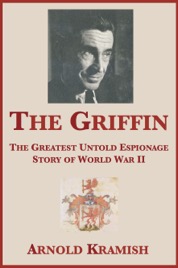 $9.99 on Kindle
$9.99 on KindleThe Griffin: The Greatest Untold Espionage Story of World War II by Arnold Kramish (101,000 words, 33 illustrations)
“The Griffin” was Paul Rosbaud’s code name as a spy. Rosbaud (1896-1963) was a distinguished science editor for the German publishing firm Springer Verlag, a close friend of leading physicists who worked on nuclear fission, and, apparently, a pillar of Nazi society. But he was also Britain’s most valuable spy in Germany during World War II.
Rosbaud supplied the British with the “Oslo Report” which disclosed, early in the war, details about Germany’s military technology, including the rockets developed at Peenemünde that would devastate London. It was from Rosbaud that the British first learned of the German intent to make the atomic bomb. When they failed to grasp the principles of the bomb, Rosbaud reported that to the British as early as 1942.
He passed his reports to Norwegian and French underground couriers who brought them to England. He helped Lise Meitner, the Austrian Jewish scientist who first interpreted the German experiments on nuclear fission, escape from Hitler’s Reich. He even visited concentration camps on errands of mercy. None of this was done for money (when he died, Rosbaud left £500) or for fame (the British Secret Service has kept his record closed), but rather through compassion for humanity and a burning hatred of Nazism.
“Among the plethora of intelligence-related volumes to have appeared within the past decade, Arnold Kramish’s carefully researched and closely reasoned biography of Paul Rosbaud... must be viewed as one of the most original and valuable.” — Donal J. Sexton, The Journal of Military History
“Kramish has assiduously gathered details of Rosbaud’s life and has delved into the murky world of Intelligence with considerable success. He has discovered much about Rosbaud that I for one did not know, even though I saw the most crucial of Rosbaud’s reports that were successfully transmitted during the war, and though I came to know him fairly well afterwards when he lived in London... Kramish has performed a welcome service in ensuring a wider appreciation of those genuine and important contributions that Rosbaud so courageously made.” — R. V. Jones, Nature (during World War II, R. V. Jones was with the British Air Staff, responsible for scientific intelligence)
“Despite Kramish’s careful research, which included interviews with approximately 500 of those who knew Rosbaud, it is an ironic tribute to this bookish spy’s mastery of his trade that the Griffin remains a surprisingly shadowy figure, one who continues to defy the effort to capture him.” — Gregg Herken, The Washington Post
“A fascinating tale of a pioneering breakthrough in technological espionage — and also of sheer courage... the events recounted... still retain their underlying tension. Rosbaud’s story is a remarkable demonstration of human ingenuity and bravery — and of the enduring values of the West — under the most adverse conditions” — James Schlesinger, former Secretary of Defense and former CIA Director
“One of the most interesting and important books on World War II published for years — a story more thrilling than any thriller I have read for a long time.” — Walter Laqueur, author of World of Secrets: The Uses and Limits of Intelligence
“This tour-de-force of a book reveals a hitherto-secret chapter in the history of the resistance against Hitler, telling for the first time how one strategically placed scientist in Germany, with the help of a small number of Norwegian and German anti-Nazis, contributed substantially to British intelligence about Germany’s fearful new weapons.” — Arvid Brodersen, leading figure in the Norwegian Resistance in World War II
“This book reads with the fascination of a good detective novel. It will stimulate controversial discussion among all those who want to know something of the beginning of our nuclear age and among those few who helped bring it about.” — General Gerd Schmückle, panzer division officer on the Russian front during World War II, later NATO deputy commander under General Alexander Haig
“The author has accomplished a mammoth task in knitting together material from 500 interviews and more than 100 archival sources, and he has succeeded in creating an intricate and sometimes fascinating picture of intelligence activities inside Germany and the occupied countries during the war.” — Peter Goodchild, Los Angeles Times



